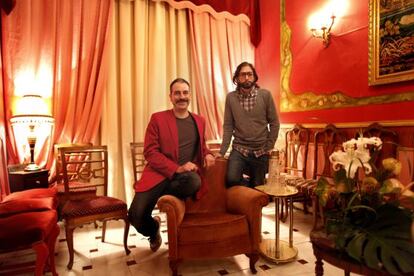Making drama out of a crisis - and a dilapidated Madrid apartment
La Casa de la Portera has reinvigorated the capital's theater scene in three months

Tired of waiting for offers, José Martret and Alberto Puraenvidia took the initiative. They rented a dark and decadent house in Madrid's Lavapiés neighborhood, got together a group of actor friends and put on a pulsating production of a Chekhov play that has captivated critics and turned La Casa de la Portera into one of the capital's leading theaters.
It sounds like fiction but it isn't. Martret and Puraenvidia got this desperate project off the ground from nothing and in the most adverse conditions. They premiered Ivan-Off , their version of the Russian classic Ivanov in which 25 spectators follow the action in two 20-square-meter rooms, on March 8, 2012. Just three months later, La Casa de la Portera has four productions running - the result of offers they received from several directors captivated by the project, and unusually large audiences. There is a two-week waiting list to buy tickets.
Amazed by the sight of the blackened walls of the dusty ground-floor apartment that had been used as the home of the building's superintendent, the premises of an anarchist group and a house for illegal immigrants over the years, Martret and Puraenvidia decided to set up the theater they believed in. "The house's energy scared us," says Martret. But perhaps that same energy, the result of a collective tragedy, is responsible for the heart-rending truth transmitted by the performers. The consequence is that this little theater with its original and risky productions has been a roaring success. The key elements: the quality, talent and art that emanates from the actors, who transform the play into a moving experience during which the engrossed audience doesn't stop crying and laughing. It is impossible to hold back, because the actors at La Casa de la Portera don't act: they live, cry, laugh, shout, talk nonsense, get drunk and die in front of the audience.
It's a rare week when a famous actor or singer doesn't show up
The logical consequence of all this is great word of mouth that has allowed La Casa de la Portera to go on filling up. It's a rare week when a famous actor, well-known singer, film director or bestselling writer doesn't show up. Mario Vargas Llosa ended up fascinated, declaring he had witnessed "two impressive hours of Russian nihilism."
More than Russian nihilism, however, Martret's play is a portrait of the Spanish depression. The author brings Chekhov to the Spain of the economic crisis, corrupt and desperate, and does so by following in the footsteps of Buenos Aires theater, a specialist in creating works of art in difficult times. Martret knows that in Buenos Aires, theater is a "magnificent sick person," as George Kauffmann called it, a theater that can overcome any obstacle.
The success story of La Casa de la Portera echoes that of Buenos Aires' Timbre 4, the apartment that director Claudio Tolcachir turned into a stage and school. The Argentinean turned his house into a theater, crammed 50 spectators into the dining room and in 2005 premiered an intimate and hilarious play that took every theater prize in Buenos Aires and captivated the Latin American and European public: La omisión de la familia Coleman .
La Casa de la Portera seems to be following slowly and carefully in its footsteps - and with no limits. Its dreams are coming true and people are rewarding the effort and the risk of the project. The old door of apartment D of number 24 Calle Abades still hides many surprises. The art of truth doesn't know the meaning of crisis.
Tu suscripción se está usando en otro dispositivo
¿Quieres añadir otro usuario a tu suscripción?
Si continúas leyendo en este dispositivo, no se podrá leer en el otro.
FlechaTu suscripción se está usando en otro dispositivo y solo puedes acceder a EL PAÍS desde un dispositivo a la vez.
Si quieres compartir tu cuenta, cambia tu suscripción a la modalidad Premium, así podrás añadir otro usuario. Cada uno accederá con su propia cuenta de email, lo que os permitirá personalizar vuestra experiencia en EL PAÍS.
¿Tienes una suscripción de empresa? Accede aquí para contratar más cuentas.
En el caso de no saber quién está usando tu cuenta, te recomendamos cambiar tu contraseña aquí.
Si decides continuar compartiendo tu cuenta, este mensaje se mostrará en tu dispositivo y en el de la otra persona que está usando tu cuenta de forma indefinida, afectando a tu experiencia de lectura. Puedes consultar aquí los términos y condiciones de la suscripción digital.








































